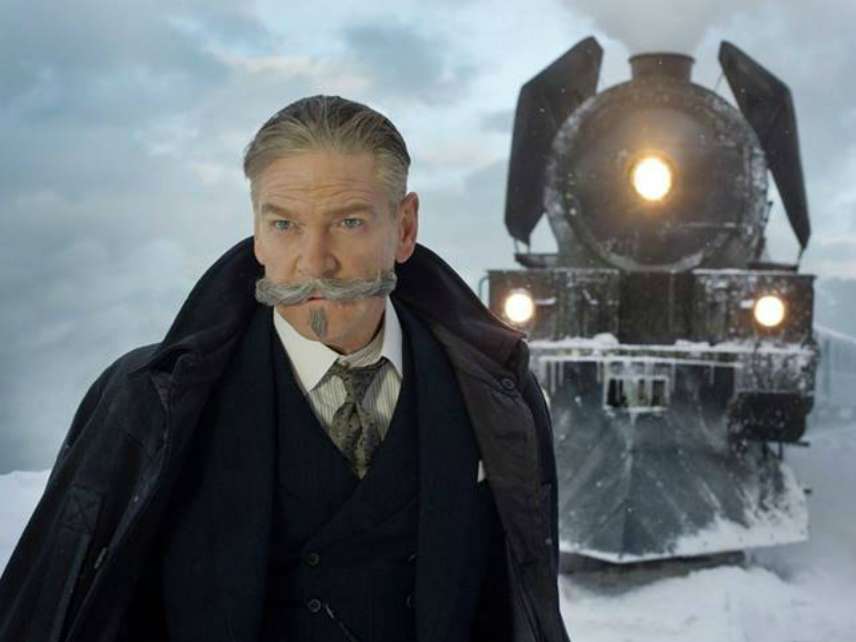Movie Review: Murder on the Orient Express
Kenneth Branagh and Daisy Ridley in a very talky take on an Agatha Christie detective classic.

By the time this latest film version of Agatha Christie's 80-year-old novel shuffled to its conclusion, the person I most wanted to see murdered on the Orient Express was the central character. Yes, I'm afraid that would be Hercule Poirot, Christie's finicky Belgian sleuth ("probably the greatest detective in the world," as he'll be the first to tell you). Here, played by Kenneth Branagh, instead of past masters like Albert Finney and David Suchet, Poirot is more annoying than usual in his nudgingly colorful eccentricities. (He requires that his soft-boiled eggs be exactly the same height in their egg cups. He is forever telling people to straighten their ties. He sports a mustache the size of a seagull.) And since Branagh is also the movie's director, I suppose we shouldn't be too surprised that his Poirot is a total spotlight-hog, mumbling helpful expository information to himself (and us) at every turn, and sometimes communing with a faded photo of a young woman he addresses as "my Katherine." (I assumed Katherine was dead, but it's possible she just got bored with this windy dude.)
The unceasing focus on Poirot sucks the air out of Christie's story, and leaves very little attention to be paid to the rest of the main cast. This is a serious flaw, because the plot and the clues to the titular mystery are tricky, and the dozen or so other characters are hazily sketched. We soon grasp who Johnny Depp and Michelle Pfeiffer are supposed to be: she's a randy widow, he's a crooked art dealer (or is he?). But I found it a little difficult at first to sort out the characters played by Josh Gad, Derek Jacobi and Judi Dench; and while Daisy Ridley and Leslie Odom Jr.'s function slowly becomes somewhat clear (they're the requisite lovebirds, among other things), and a mysterious Austrian played by Willem Dafoe doesn't stay mysterious for too long, Penélope Cruz's sorrowful Spanish missionary remains boring right up to the end—where in the long tradition of locked-room mysteries, everything is made clear by the world's greatest detective.
You'd think the story would be fairly well-known by this point. Having just closed another case (in a long, irrelevant opening section set in Jerusalem), Poirot is now boarding the luxurious Orient Express in Istanbul, heading back to his home base in London. But then he's approached by a fellow passenger, the shifty Ratchett (Depp), who's been getting threatening letters and wants to hire Poirot as a bodyguard, to "watch my back." (I'm sure people said things like that in 1934, the year in which this story takes place.) The following morning, Ratchett is found stabbed to death in his first-class compartment, which is locked on the inside. By this point, the train has come to a stop, its way forward blocked by an impassible mountain of snow that has been dumped on the tracks by a mini-avalanche. So no one is going anywhere. Poirot's investigation—which involves a lot of talk-talk-talk—begins.
In the same way that Quentin Tarantino gained very little by shooting The Hateful Eight in a widescreen format, Branagh also miscalculated, I think, in deciding to film this movie in 65mm. The intense clarity afforded by widescreen photography highlights every powdered pore, every badly affixed hairpiece, and every fake-looking digital effect. The panoramic possibilities of 65mm are largely wasted on scenes set within the narrow corridors of the train; and outside, where Branagh must have been hoping it would add majestic sweep to the snowy mountain exteriors, the glut of airless CGI used to render the clouds and rocks and rickety bridges turns every shot into a model-train layout.
This is a shame, because the actors generally provide just the sort of all-star appeal this kind of story requires. Jacobi, Dench and Cruz are wasted, but Ridley and Odom exude unmistakable star power, Pfeiffer attacks her role with old-pro exuberance, and Depp…doesn't embarrass himself. The movie is clumsily structured and oddly executed (a scene in which Branagh and Ridley sit outside the train at a table having coffee—in what we've been told is the freezing cold—is strikingly dopey), and maybe some of the blame for that can be laid at the feet of screenwriter Michael Green (Blade Runner 2049). But since the star and director is also one of the film's producers, probably not a lot.
